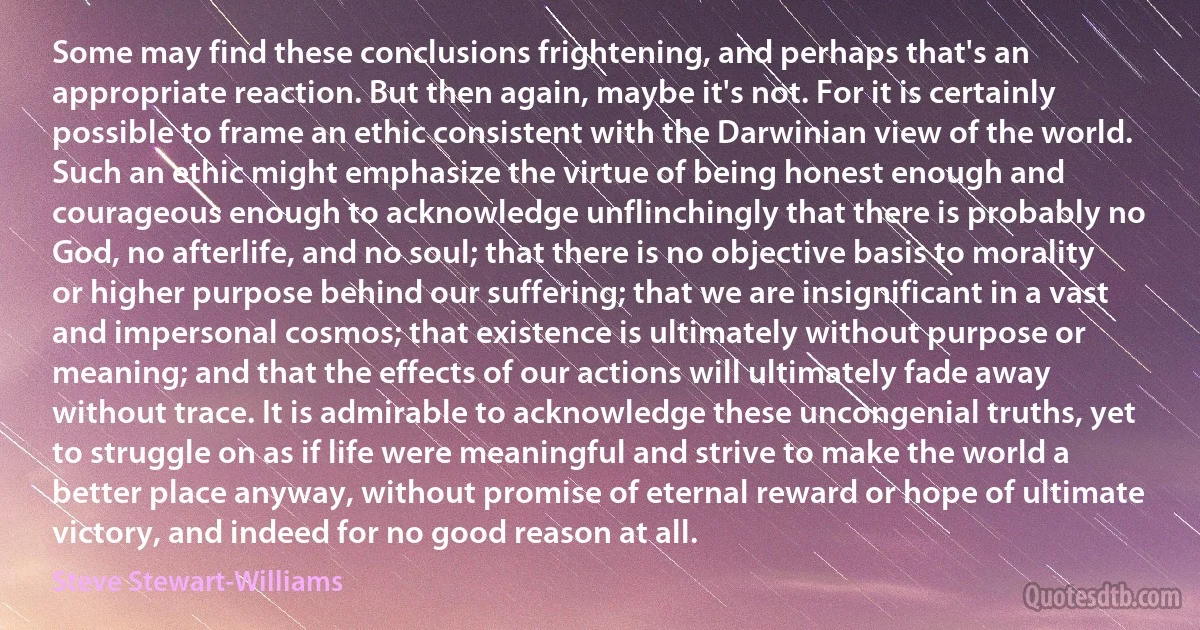
Some may find these conclusions frightening, and perhaps that's an appropriate reaction. But then again, maybe it's not. For it is certainly possible to frame an ethic consistent with the Darwinian view of the world. Such an ethic might emphasize the virtue of being honest enough and courageous enough to acknowledge unflinchingly that there is probably no God, no afterlife, and no soul; that there is no objective basis to morality or higher purpose behind our suffering; that we are insignificant in a vast and impersonal cosmos; that existence is ultimately without purpose or meaning; and that the effects of our actions will ultimately fade away without trace. It is admirable to acknowledge these uncongenial truths, yet to struggle on as if life were meaningful and strive to make the world a better place anyway, without promise of eternal reward or hope of ultimate victory, and indeed for no good reason at all.
Steve Stewart-WilliamsRelated topics
behind darwinian enough ethic find frame good hope impersonal life might meaning objective perhaps place possible promise purpose reaction reason reward soul strive suffering ultimate vast victory view virtue world yet afterlife higherRelated quotes
The first stable conclusion I reached ... was that the only thing brains could do was to approximate the responsivity to meanings that we presuppose in our everyday mentalistic discourse. When mechanical push comes to shove, a brain was always going to do what it was caused to do by current, local, mechanical circumstances, whatever it ought to do, whatever a God's-eye view might reveal about the actual meaning of its current states. But over the long haul, brains could be designed – by evolutionary processes – to do the right thing (from the point of view of meaning) with high reliability. ... [B]rains are syntactic engines that can mimic the competence of semantic engines. ... The appreciation of meanings – their discrimination and delectation – is central to our vision of consciousness, but this conviction that I, on the inside, deal directly with meanings turns out to be something rather like a benign "user-illusion".

Daniel Dennett
What has been shown by Machiavelli, who is often (like Nietzsche) congratulated for tearing off hypocritical masks, brutally revealing the truth, and so on, is not that men profess one thing and do another (although no doubt he shows this too) but that when they assume that the two ideals are compatible, or perhaps are even one and the same ideal, and do not allow this assumption to be questioned, they are guilty of bad faith (as the existentialists call it, or of "false consciousness,” to use a Marxist formula) which their actual behavior exhibits. Machiavelli calls the bluff not just of official morality-the hypocrisies of ordinary life-but of one of the foundations of the central Western philosophical tradition, the belief in the ultimate compatibility of all genuine values. His own withers are unwrung. He has made his choice. He seems wholly unworried by, indeed scarcely aware of, parting company with traditional Western morality.

Isaiah Berlin
At the base of the plane, Styles freelance photographer is down on one knee, going handheld, still in the same Hawaiian shirt. The famously reclusive R. Vaughn Corliss is nowhere in view. Doug Llewellyn's wardrobe furnished by Hugo Boss. The Malina blanket for the artist's lap and thighs, however, is the last minute fix of a production oversight, retrieved from the car of an apprentice gaffer whose child is still nursing, and is not what anyone would call an appropriate color or design, and appears unbilled. There's also some eleventh hour complication involving the ground level camera and the problem of keeping the commode's special monitor out of its upward shot, since video capture of a camera's own monitor causes what is known in the industry as feedback glare - the artist in such a case would see, not his own emergent Victory, but a searing and amorphous light.

David Foster Wallace
In these pages, I continue the struggle to which my whole life is devoted. Describing, I also characterize and evaluate; narrating, I also defend myself, and more often attack. It seems to me that this is the only method of making an autobiography objective in a higher sense, that is, of making it the most adequate expression of personality, conditions, and epoch.
Objectivity is not the pretended indifference with which confirmed hypocrisy, in speaking of friends and enemies, suggests indirectly to the reader what it finds inconvenient to state directly. Objectivity of this sort is nothing but a conventional trick. I do not need it. Since I have submitted to the necessity of writing about myself - nobody has as yet succeeded in writing an autobiography without writing about himself - I can have no reason to hide my sympathies or antipathies, my loves or my hates.

Leon Trotsky
I told him how we kept fewer forms between us and God; retaining, indeed, no more than, perhaps, the nature of mankind in the mass rendered necessary for due observance. I told him I could not look on flowers and tinsel, on wax- lights and embroidery, at such times and under such circumstances as should be devoted to lifting the secret vision to Him whose home is Infinity, and His being - Eternity. That when I thought of sin and sorrow, of earthly corruption, mortal depravity, weighty temporal woe - I could not care for chanting priests or mumming officials; that when the pains of existence and the terrors of dissolution pressed before me - when the mighty hope and measureless doubt of the future arose in view - _then_, even the scientific strain, or the prayer in a language learned and dead, harassed: with hindrance a heart which only longed to cry - "God be merciful to me, a sinner!"

Charlotte Brontë
